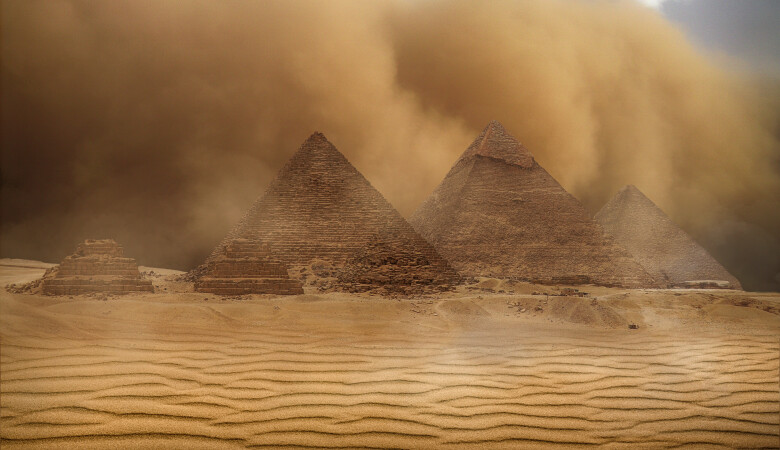Lessons from a Miraculous Slaughter (Isaiah Sermon 41 of 80)
February 17, 2013 | Andy Davis
Isaiah 37:1-38
Glory of God, Sovereignty of God, Love of God
Pastor Andy Davis preaches a verse-by-verse expository sermon on Isaiah 37:1-38. The main subject of the sermon is a lesson from a miraculous slaughter.
- SERMON TRANSCRIPT -
Many, many times, as I consider the ministry of the pulpit, I think about what it is that I'm trying to achieve as I stand here and preach. I think I really zero in on one thing: my desire is to preach for faith. I want you to believe. I want you to be able to see what you cannot see with your physical eyes, to see with your hearts, that the eyes of your hearts would be enlightened, and you would know what there is in the invisible spiritual realms around us, and only Scripture can do that. Scripture gives birth to faith, and Scripture also feeds faith and nourishes and sustains it, so that's what I feel like I'm called to do. And so I think often about those passages of Scripture that give me a glimpse of Christ on his throne, like Revelation 4, where he, on the island of Patmos, heard a voice, and he saw a door standing open in heaven, and the voice said, "Come up here," and he went up and immediately he saw a throne in heaven with Someone seated on it. I feel if I could get that throne in some way established in your minds and hearts by the proclamation of the word, then I will have done what I think the Lord's calling me to do today.
I also think about the Scripture that says, "The fear of the Lord is the beginning of wisdom." And I think we should fear a God like this, dear friends, I think we should fear a God who can send out the angel of the Lord and kill 185,000 troops just like that. We should fear him, and through faith in the gospel, as John Newton put it, "Twas grace that taught my heart to fear, and by grace, my fears were relieved.” I would love to have those fears relieved by a clear faith in Christ, crucified and resurrected, so I'm just laying all my cards on the table here for you. This is what I want you to do. I tend to see Isaiah 36-37, what's going on there in not just historical terms, what was happening back then, I think it's all completely accurate history. It's not a mere metaphor, a fable, or a myth, or any of that, it absolutely happened, but I think there are definitely spiritual principles for us, so I tend to see representation. I feel that Sennacherib, the king of Assyria and his tens of thousands of troops coming up right to the walls like a mighty flood to sweep them all the way, that represents Satan and my sins and the wickedness that would sweep me away and kill me and destroy me forever and ever, my enemies. And Hezekiah represents the believer, not righteous in and of himself, but trusting in the Lord knowing he has no claim, no just claim on God to do anything, but humbly beseeching God for salvation, for deliverance. I find myself in that, not just him, but that small remnant of Jews that was left huddled within the walls of Jerusalem, and then I see the angel of the Lord going out and destroying all of the enemies. And dear friends, that is Christ, my hero, my savior, my king, who has gone out before me to save me from eternal death. That's how I see it. Now, if you wanna call that allegorical, whatever you wanna do with that, that's just what I think is going on. I think it actually happened in space and time, I think that those things are all true, but I think there are some timeless spiritual lessons that we should draw from this incredible chapter.
So let's go back into the history, 'cause I think it's so beautiful that in the Bible so rich and full of history, and we are not theological liberals who say it never really happened, but it's teaching us spiritual lessons. We don't do that. We say both, we get it all. We say, “I do don't know the history actually happened, and it has spiritual lessons, and so these things actually happened.” Ours is a wonder-working God. He is a miracle-working God. Amen. He can do mighty things in space and time, he can astounded us and stupefy us by what he can do. Along with that, they'll come these spiritual lessons.
I. The Astonishing Events of Isaiah 36-37
Now, the history. We're dealing with the mighty empire of the Assyrians, Sargon had died, his son Sennacherib took his throne. At that point, a number of the puppet kings, the smaller kings who were paying tribute to the Assyrians, decided to challenge the son to see if he was determined to hold on to his kingdom. It is a good opportunity to break away, so they thought. So they tested Sennacherib, and it seems like Hezekiah, king of Judah, was one of them. And in the book of Chronicles, in 2 Chronicles, it gives us an indication that he was doing this by faith, out of service to God, by his faith in God, he had the courage to break with Assyria and not do what his faithless, his godless father Ahaz had done, making an alliance with Assyria and finding protection in that.
Well, to put it mildly, Sennacherib and the Assyrians didn't take it kindly, and they really did mean to hold on to their empire, not only that, but they had the power to do so, and so they begin taking on these smaller kings and defeating them one after the other, which is just what the Assyrians do, it's what they did. And so they're just destroying one city after another, they're winning back allegiance from one small king after another, and it seems to me that they saved Hezekiah for last, which indicates that there was perhaps a ring leader sort of thing, and they're gonna make an example of him. Dear friends, who got made an example of here? Isn't that marvelous? But they wanted to make an example of Hezekiah, perhaps. And so the invaded Judah, as Isaiah the prophet had said they would do.
And he makes it very plain, they were getting invaded because of their wickedness and their sin. They deserved to die, and it would do well for you to remember that you do too. The wages of sin is death. And we deserve to die. There's no difference, ultimately, in one sense, between us and the Assyrians who were slaughtered. We deserve to die, and many of those Jews did in fact die under the just wrath of God, Sennacherib killed them. And so he took over 46 cities and towns and villages in Judah, he sent a detachment of soldiers under the Rabshakeh, the field commander in Isaiah 36, just a portion of his army to intimidate the remnant of Jews and Hezekiah that were huddled within the walls of Jerusalem.
Now, Jerusalem was a tough citadel to take, it was not gonna be easy to do. And so to save himself the trouble of fighting and siege warfare and all that, he thought to intimidate Hezekiah through this field commander and Isaiah 36 speaks of that. In verse 18-20, the field commander speaks these words of blasphemy, Isaiah 36, "Do not let Hezekiah mislead you when he says, ‘The Lord will deliver us.’ Has the god of any nation ever delivered his land from the hand of the king of Assyria? Where are the gods of Hamath and Arpad? Where are the gods of Sepharvaim? Have they rescued Samaria from my hand? Who of all the gods of these countries has been able to save his land from me? How then can the Lord deliver Jerusalem from my hand?" And so with many words of arrogance and blasphemy and psychological warfare and intimidation, the field commander intimidated and blustered to the men who were sitting on the walls and to Hezekiah seeking to get them to come out. Chapter 36.
Thirty-seven is the response to these events. In verses 1-4, we see Hezekiah’s humility as he responds in sackcloth seeking answers, he sends some messengers, Eliakim, Shebna and they go to Isaiah the prophet, they're wearing sackcloth, everyone's humbled. And Hezekiah seeks just prayer, he just wants prayer from Isaiah. “Tell Isaiah to pray for the remnant that still survives.” But God gives what Hezekiah did not ask for at that point—he gives a prophetic answer, and God's first judgment, word of judgment against Assyria at this point, "Fear not, the blasphemer will die." Look at verses 5-7, “When Hezekiah's officials came to Isaiah, Isaiah said to them, ‘Tell your master, “This is what the Lord says: Do not be afraid of what you have heard—these words with which the underlings of the king of Assyria have blasphemed me. Listen! I'm going to put a spirit in him so that when he hears a certain report, he will return to his own country, and there I will have him cut down with the sword.”’" So fear not, the blasphemer will die. Well, of course, that doesn't do you much good if you're also gonna be killed first, but it is the beginning of God's answer, “Fear not.” He's going to give a more thorough answer later in the chapter.
At this point, some events start to overtake us. Egypt marches out to fight as they were paid to do, and Assyria went off and went out to fight them, as they were definitely going to do, and Assyria won easily. And so Tirhakah, the cushite king of Egypt was defeated and ran away, just as Isaiah had said in chapters 30-31, “Egypt's help will bring you no refuge; they will be actually to your shame, and you will regret all the money you spent to hire those soldiers.” But as all that's going on, the king of Assyria sends apparently a letter with more blasphemy and more intimidation, more bluster, the same type of message. And you have that in verses 8-13, beginning at verse 10, "Say to Hezekiah king of Judah: Do not let the God you depend on deceive you, when he says, ‘Jerusalem will not be handed over to the king of Assyria.’ Surely you've heard what the kings of Assyria have done to all the countries, destroying them completely. And will you be delivered? Did the gods of the nations that were destroyed by my forefathers, deliver them—the gods of Gozan, Haran, Rezeph and the people of Eden who were in Tel Assar? Where is the king of Hamath, the king of Arpad, the king of the city of Sepharvaim, or of Hena or Ivvah?”
So this letter comes and Hezekiah in versus 14-20 spreads out the letter before the Lord. He goes to the temple, still wearing sackcloth, I'm sure, and he prays to the Lord, spreads out this issue, spreads out this letter, and the whole thing, just spreads it out before God in prayer, and he prays, verse 16, "Oh Lord Almighty, God of Israel, enthroned between the cherubim, you alone are God over all the kingdoms of the earth. You have made heaven and earth. Give ear, O Lord, and hear; open your eyes, O Lord, and see; listen to all the words, Sennacherib has sent to insult the living God. ‘It is true, O Lord, that the Assyrian kings have laid waste all these peoples and their lands, they have thrown their gods into the fire and destroy them, for they were not gods, but only wood and stone fashioned by human hands. Now, O Lord, our God, deliver us from his hand, so that all kingdoms on earth may know that you alone, O Lord, are God.’" And so that's the prayer of this godly man, Hezekiah.
We talked about it last week, I'm not gonna go into details, but the verdict comes down from the king of the universe, as I pointed out last week, first it's words, then it's actions. And that's how it is with us. God first promises to deliver us, and then he does so, and what we are feeding on now, every day, we believers, is words, that's what we have, we have words. And so we feed on these words every day, and they are not idle words for us, these words are our life and we feed on them, and so God says what he's going to do, and then he does it, and so this is the verdict coming down, and you heard Rick read these words, these verses, so I'm not going to go through them again, but you can see how the Lord gives the verdict. As it comes down, “the virgin daughter of Zion of Jerusalem tosses her head as you flee,” and so there's this sense of mocking. I think often in 1 Corinthians 15, where we will get to mock death and we'll get to say, "Where, O death is your sting now? Where, O grave is your triumph? Look at me now—I'm alive! And the grave has been thrown into the lake of fire, so death is dead and I live.” So isn't that beautiful? There's a sense of victory, and you see in what Rick read and what the king of Assyria said, you see the attitude of blasphemy and arrogance as he claims God-like characteristics, the ability to ascend to the heavens and to send down into the depths and to do all these mighty things, this arrogant man. But God in the middle of it said, "Haven't you heard that I have planned everything you did? I am the great author, and I am the orchestrator, I am the director of human history. There is nothing you have done that I did not ordain for you to do. So I ordained it, I ordained that you'd turn cities into piles of rubble.”
Now, you may say, Why would God do that? Well, because all have sinned and fall short of the glory of God, and the wages of sin is death. And the people who were killed in those invasions deserved to die. And God was using Assyria to kill 'em. The Assyrians deserve to die too, and God will use some other people to kill them. And this is how history goes, but God is orchestrating all of that. And God says, "I know where you stay and when you come and go and how you rage against me." And he issues this verdict against him, "I am going to put my hook in your nose and my bit in your mouth, and I am going to make you return by the way that you came, and I'm going to raise up, for you, Hezekiah, a remnant that's gonna grow up and flourish and come alive again, and you will feed on the fruit of the land," and he says, "The zeal of the Lord Almighty will accomplish this."
And then he gives in a final way, his verdict, verses 33-35, "Therefore, this is what the Lord says concerning the king of Assyria: ‘He will not enter the city or shoot an arrow here; he will not come before it with shield or build a siege ramp against it. By the way that he came he will return. He will not enter this city…. I will defend this city and save it, for my sake and for the sake of David my servant!" And then he does it, he sends out the angel of the Lord. And in one night, the angel of the Lord kills 185,000 Assyrian troops. And then though the text doesn't say it, history tells us, 20 years later, he kills Sennacherib too. Twenty years later, and he does it by his own sons while he's worshipping his false god.
II. Lessons from this Miraculous Slaughter
Now, there's no end to the lessons that could come out of this chapter, but I've lifted up 10 and there really are 10 this time, dear friends. There really are. So if you wanna get an eleventh out of it, there are more than this, but these are the 10 we're going to look at. So first, central lesson, not only of Isaiah 37, but of the entire Bible. God's glory is uppermost in his own affections. The most important thing to God is his own glory. The most important thing to God is his own name, his own reputation. He does everything for his own glory. And this is incredibly important for us idolatrous people to learn. We are forever exchanging the glory of God for images and for idols and worshipping and serving the creature rather than the Creator. And we Christians are in the process of being completely healed of that, and this sermon is part of your healing and mine, so that we learn to stop being idolaters and become as God-centered in our hearts as God is in his. God does everything for his own glory. His glory is uppermost in his own affections.
In 1900 when Harvard University was finishing a building called Emerson Hall that was going to house their philosophy department, they were soliciting inquiries about what caption should be inscribed across the door, and one professor of philosophy suggested something from the Greek philosopher Protagoras, "Man is the measure of all things." But Harvard President Eliot wisely chose this instead, "What is man that you are mindful of him?" And that's what's over those Harvard students as they walk in there, there's Psalm 8. We are used to seeing everything from a man-centered perspective, in which man gets bigger and bigger and bigger, and God gets smaller and smaller. That is what secularization is all about. A secular society and the process of secularization is the process by which God is minimized. But the Scripture is exactly the opposite. "O magnify the Lord with me, and let us exalt his name together." And so, human sinners are used to kind of reversing Psalm 8, in effect saying, "What is God that we should be mindful of him?" But God's glory is uppermost in his own affections, and he does everything for his own glory.
And what do I mean by that? What do I mean by his glory? God's glory is the radiant display of his own attributes, his own nature, the bright, shining display of who God is, God put on display in his perfection. So I think of the attributes, the characteristics of God. And Jonathan Edwards wrote a dissertation on the end, the purpose for which God created the world. Why did God make it? And I would extend beyond that to say, why does God also orchestrate human history in that world? They're the same thing. God created the world and he orchestrates human history, says Edwards, so that his own glories, his glory may be put on display. God created it to make a theater for his own glory. He wrote a play so that we could understand his attributes and his nature, that play is human history, and he wrote those lines and the actors and all of it on it, all of it, created and sustained by God for one purpose: a display of his glory.
Edward says this, "If the world had not been created, then these attributes never would have had any exercise. The power of God, which is a sufficiency in him to produce great effects." Do you not see that in this chapter, the power of God, a sufficiency to produce a great effect? Well, if there hadn't been a world, then we wouldn't ever have been able to see this power of God to produce great effects, and that power “must forever lie dormant and useless as to any effect. The divine wisdom and prudence would have had no exercise in any wise contrivance or any prudent proceeding or disposal of things; for there would have been no objects of contrivance or disposal. The same might be observed of God's justice and goodness and truth. Now, God would have known that he possessed these attributes,” but he wouldn't have been able to put them on display, and if those attributes are excellent, then the display of them is excellent, and therefore it was excellent for God to make a world. And it was excellent for him at certain points in history to put himself on display, and that's what he's doing in this chapter.
So God raises up great monsters, great sea monsters, and cuts them to pieces with the sword of his mouth, like Leviathan. He raises up monsters out of the sea, Daniel 7, one beast after another, one beast, and then he sitting on a throne of fire rules over those beasts for his own glory. Daniel 7, and Assyria was a beast, and God is able to put the bit in the mouth of the beast and do whatever he wants with it, and so God's glory is uppermost in his own affections, and he raises up kings like the king of Assyria like Sennacherib, or like Pharaoh, and he hardens Pharaoh's heart. He said, "You know by now I could have wiped you off the face of the earth. I want you to know that I have that power to do that. By now, I could have wiped you from the face of the earth, but I raised you up, Pharaoh, you individual human being, I raised you up, seated you on your throne over Egypt for this very purpose, that I might show you my power and that my name might be proclaimed in all the earth."
So we must realize, the greatest force there is in the universe is this God's zeal for his own glory. It is the greatest force in the universe. I say to you, brothers and sisters in Christ, it should be the greatest force in your life too, it should be the central motivating factor of your own days. Every day, may God be put on display in my life. May my words and my actions put God on display. “Let your light shine before men that they may see your good deeds and glorify your Father in Heaven.” That's how you should live.
So what is it that motivates God here in this account? Is it not the dishonor done to him by the field commander and by Sennacherib? Isn't that what motivates him? Isn't that what Hezekiah knows is gonna motivate him? Look at verse 23, "Who is it you have insulted and blasphemed? Against whom have you raised your voice and lifted your eyes in pride? Against the Holy One of Israel!" This is the arrogance and pride of the Assyrians that motivates him.
Secondly, therefore, because this is true and central, God's actions, all of them are first for his own name and then only second for human salvation. There's just almost an infinite gap between those two. They're not at war with each other. God saves us from hell, he saves us from sin, saves us from our enemies for his own glory. That's why he does it. Human salvation then is the greatest work on which God has ever embarked, but I'm just saying the reason why he does it is for his own glory, and he says that again and again and again. It's not one or two times. “I want you to know why I'm saving you. I want you to know why I'm saving you.” Isaiah 43 says in verse 25, "I, even I, am he who blots out your transgressions, for my own sake, and remembers your sins no more." So God saves us and blots out our sins for his own sake, for his own glory. He says again in Isaiah 48:9-11, "For my own name's sake I delay my wrath; for the sake of my praise I hold it back from you, so as not to cut you off. Behold, I have refined you, though not as silver; I have tested you in the furnace of affliction. For my own sake, for my own sake, I do this. How can I let myself be defamed? I will not yield my glory to another."
And so God saves us for his own glory, and he says this again and again in Ephesians, he says that he saves us, “In love he predestined us to be adopted as his sons through Jesus Christ, in accordance with his pleasure and will—to the praise of his glorious grace.” And again, in Ephesians 1, "In him we're also chosen, having been predestined according to the plan of him who works out everything in conformity with the purpose of his will, in order that we, who are the first to hope in Christ, might be for the praise of his glory." And then in verse 14, Ephesians 1:14, same thing again, “for the praise of his glory.”
The greatest issue then surrounding the walls of Jerusalem that day is not the salvation of Hezekiah and the remnant of Jews still alive. It is that God might display his glory in saving that remnant. Now, we should not think that there's any kind of warfare between God's glory and his love, he does love us. It is because of love, he sent Jesus into the world to be our savior. Is not love an attribute of God? Is not an open display of the love of God for sinners like us much to his glory? Yes, it is. But it's because of that that he saves us. That's why he sent Christ to die for us for the praise of his glory.
"The greatest issue then surrounding the walls of Jerusalem that day is not the salvation of Hezekiah and the remnant of Jews still alive. It is that God might display his glory in saving that remnant."
Third, this chapter teaches us that God's power and knowledge are awesome. I said last week, I say it again, I'll say it another time as strongly as I can, every single one of us underestimates God. You are thinking too lowly of God. Actually, I could even take certain attributes and say, you underestimate the knowledge of God. You don't really understand how much he knows. How completely his knowledge has searched you, he has known you, he knows everything about you. The omniscience of God is just staggering. God's knowledge is overwhelming. And so is his power. So he knows the thoughts of Sennacherib's mind when he says in the middle of Isaiah 37, he said, "You said in your heart, I have done this and I have done that." He's telling him what his heart conversation's like. “Let me tell you what else you were thinking.” It's kind of like when Jesus, knowing the hearts, the thoughts of the people around him, answers them. I love that. Jesus answered them. “Well, I didn't say anything.” “You didn't need to. I know everything you're thinking. I know everything about you.”
God's omniscience is absolutely staggering. He knows everything. He knows how Sennacherib raged against him and his insolence has reached his ears. And then rather intimidating, and it's actually pretty terrifying, look at verse 28, “But I know where you stay.” We were talking about this last week at homefellowship, reminds me of a movie I saw in which there was a terrorist who was threatening a man. And he calls him up in the middle of the day and describes what his elementary school age daughter was wearing that day. Now suppose you've got a phone call like that. That's terrifying. You know what that is? That's a clear threat. And so is verse 28, do you not see it? “I know where you stay and when you come and go.” “You're right in the center of my cross hairs and you cannot escape. If you ascend to the heights of the heavens, I'm there. If you go down to the depths, I'm there. There's nowhere you can go to get out of my cross-hairs." Actually, there is one place though you know what it is, there is a place to get out of the cross-hairs of God the Father, that's the cross of Jesus Christ, that's the refuge where he will no longer single you out for judgment.
But just verse 28 is God's omniscience in threatening mode, “I know where you stay and when you come and go.” And he knows the future as well. He says, "I'm going to do this and I'm going to do that. This is what's going to happen.” “I'm going to put a spirit in him so that when he hears a certain report, he's gonna return to his own country, and there I'm gonna have him cut down with the sword." So not only we do have God's incredible knowledge, we also have his power, which goes together making his sovereignty, he knows what to do, he's got a wise plan, and then he's got the power to do it.
So number four, God is sovereign over the nations and rules over the hearts of kings. The nations are nothing compared to God. They're like dust on the scales. They're like drops from a bucket. They're like grasshoppers as he sits in throne above the circle of the earth. The nations are nothing, and God raises them up and lowers them down and does everything he wants with the nations, as he says, "Have you not heard?" Look at verse 26-27, "Long ago I ordained it. In days of old I planned it; now I have brought it to pass." This is the sovereignty of God, and God's sovereignty goes right to the hearts of kings. “The king’s heart is in the hand of the Lord; he directs it like a watercourse wherever he pleases,” Proverbs 21:1. And so he says, "I'm gonna put a certain spirit in him," do you see that? “I'm gonna put a spirit inside his heart so that when…” And then he controls the external circumstance, "When he receives a certain report, he's going to do this," you see. It's like, "Wait, wait, wait, now I thought God wasn't allowed to do that. I thought we have free will and he's gotta stay outside and knock on the door of our hearts, and if we choose to let him in, then he can do some things, but if not, then he can't.” Friends, there is nothing God cannot do with the things he's made. He doesn't ask our permission and he has access to our hearts and minds. And he says, “I'm going to put a spirit in Sennacherib.” “Say wait a minute, Sennacherib doesn't even believe in you.” “It doesn't matter, it doesn't matter what Sennacherib believes, matters what I can do, and I can put a certain spirit in him so that he will do what I want him to do.”
"God is sovereign over the nations and rules over the hearts of kings. The nations are nothing compared to God"
And this doesn't just apply to Sennacherib, it's applied to Hezekiah. Is not God working in Hezekiah too? Is he not stripping him of his confidence in his political machinations and his emissaries to Egypt and all of the stuff he likes to do all the time, isn't he stripping him entirely of that, and so he is cast completely and totally on the Lord alone? And so God has sovereign power over our hearts, and he is able to do these things, and 20 years later, to raise up a couple of assassins from Sennacherib's own family, Adrammelech and Sharezer and have him cut down with the sword. He's able to do that and he's able to do it in exactly the right place. The temple of his god Nisroch while he's worshipping him. Whose god is nothing now? God has that power.
Fifthly, fifth lesson, behold, the arrogance of the human heart. Behold, the arrogance of the human heart. Do you not see it? Do you not see the incredible arrogance? “Who of all the gods of these countries has ever been able to save his land from me? How then can the Lord deliver Jerusalem from my hand?” Do you not hear that? It's arrogant. Or, “Say to Hezekiah king of Judah: Do not let the God you depend on deceive you.” It's blasphemy. Every single day, human sinners all over the earth do this kind of blaspheming. They underestimate God. They take his name in vain. They blaspheme him. They underestimate his power. They mock him. They do not believe in him. They do not understand him. They do not seek him.
Now, here's the thing, when I say, "Behold, the arrogance of the human heart," I want you to look into Isaiah 37 as into a mirror. It's not, "Oh, look at those arrogant people out there." It's, "God, am I really... Am I like this? Am I anything like Sennacherib?" Yes, you are. Maybe you don't have his power, his skills, or capabilities, or his high birth, but as a descendant of Adam, you have the same kind of blasphemous, arrogant, rebellious streak against God, and Christ, his gospel is the only thing that can save you from it. We're all like this, apart from the grace of God, that's who we are, we are Sennacherib. We may not have his opportunities and powers and skills, but we've got that same heart of rebellion, and so apart from Christ and apart from the regenerating power of the Holy Spirit, this is who we are. Look in this text as into a mirror.
Sixth. God opposes the proud, but gives grace to the humble. Does this chapter not teach this abundantly? This text is given to us twice in the New Testament, James 4:6, "God opposes the proud but gives grace to the humble." 1 Peter 5:5, "God opposes the proud but gives grace to the humble." I figure if God says something twice, it's important. If God says something once, it's important. If he says it twice, it's really important. By the way, this story, this whole thing is in the Bible three times. It's in 2 Chronicles, 2 Kings, and Isaiah 36-37. The story is hugely important. God wants us to know he opposes. Do you want this kind of God opposing you? You will lose. And how does he oppose Sennacherib? Well, by killing him, by killing his troops, by putting a hook in his nose and dragging him where he wants him to go. He fights against him. And how does he give grace to the humble? Do you not see the humility of Hezekiah in his sack cloth, in his meek lowliness and his broken-heartedness as he seeks God in prayer, as he's mindful of his own sins and says, "This is a day of distress and rebuke and disgrace.” “We deserve what we're getting here." Does this text not make you end up being like that tax collector that stood off at a distance and beat his breast and wouldn't even look up to heaven and said, "Be merciful to me, oh God, the sinner." Let this text humble you. Say, “Is it really this bad, are we really this wicked?" We are. And yet God gives grace to the humble. He forgives their sins and gives them eternal life.
Seventh, God answers humble prayer that's focused on his glory. Hezekiah takes this thing and spreads it out before God. His life is directly threatened. I don't know what it would have been like for Hezekiah if God had chosen not to save him, what the King of Assyria would have done to him. They were known for their torture. I think ancient historians tell us they're the ones that invented crucifixion. They wanted a slow torturous death, so he was going to die. Sennacherib and his army was like a dagger right across his jugular, ready to kill him. And yet, for all of that, Hezekiah's prayer is ultimately focused on the glory of God. "Deliver us, Oh Lord…so that all kingdoms on earth may know that you alone, O Lord, are God." And God wants us to pray like that, he wants us to learn to pray not based on our own righteousness or our own good works or any of that, but based on his glory. “O God, deliver me from sin, so that you can be glorified in my life. My sin strips you of glory. Deliver me, Oh Lord. Glorify your name.” Learn to pray like that.
Eighth, God is patient toward the wicked. God is patient toward the wicked. Romans 9:22 says, "What if God, choosing to show his wrath and make his power known, bore with great patience the objects of wrath prepared for destruction." He bears with great patience these wicked ones. Sennacherib, as I said, history tells us was left alive for 20 more years after this. he had 20 years to think about what happened outside the walls of Jerusalem, but in all of that time, do not be misled, “Do not be deceived [by that long delay], God cannot be mocked,” you understand? His patience towards sinners is to give them an opportunity to repent, that they will repent of their sins. God's patience towards you leads you toward repentance, Romans 2 tells us that, but most wicked people don't use the time well. They do not use that delay well. They're under the death penalty. The wages of sin is death. It's appointed to each one of them to die and after that to face judgment, but they don't use that time well, and Romans 2 says, what they're doing instead is storing up more and more wrath against themselves. When the day of God's judgment and wrath will be revealed, God will give to each person according to what he has done. But the Lord has a day in store for judgment.
Ninth, God's wrath is terrifying. Instant death fell on 185,000 Assyrian troops. Now, there was something quite extraordinary about this, and something actually quite common place about this. It's extraordinary, obviously, because they all dropped dead. They were healthy soldiers, young men in their prime and they're all dead. That's extraordinary. What's not so extraordinary about this is that God actually does something about like this every single day. Statistics show that somewhere between 150,000 and 160,000 people die every day. Every single day. You're saying, "Well, God doesn't have anything to do with that." When God says, “You die,” you die. If God says, "You keep living," guess what you do, you keep living. Because in him, you live and move and have your being. And so Psalm 104 says, "When he takes away their breath, they die and return to the earth." So God kills 150,000+ people every day. Our God is a God who expresses his wrath every day. He just doesn't send newspaper headline and say, "Oh, by the way, here's some of my wrath and here's some of my wrath and here's... " No, no, but the time runs out for people, 150,000 every day.
And so behold then the wrath and the judgment of God, and fear it. And as John the Baptist said to his enemies who were coming out to here him preach, he said, "You brood of vipers who warned you to flee [From what?] the coming wrath.” There is a wrath to come. But thanks be to God, 1 Thessalonians 1:10 says that Jesus rescues us from the coming wrath. So this is, it's good to know there is a coming wrath and that Jesus can rescue you from it. Far greater numbers are gonna be slaughtered at the end of the world. Read about it in the book of Revelation. One plague takes out a third of mankind. Well, that's not 185,000, that's billions. God has that kind of power.
And tenth, God's grace and mercy to sinners is amazing. Sinners who were saved, who were delivered in Jerusalem were no better than the sinners who died outside the walls. Intrinsically, they were the same. The difference was the sovereign grace and love of God. It's the only difference. And marvel at it, marvel at the grace of God to sinners in Christ, and he is publishing abroad this one simple message: Repent and believe in Christ for the forgiveness of your sins. God saves sinners. And if you'll flee to Christ, he will give you eternal life.
III. One Challenging Question
Now, in all of this, there's a challenging question, isn't there? If God can do this kind of thing any time, why doesn't he do it more? Why do any of God's people ever suffer? Why are there any pastors languishing in jail? If God has the ability to deliver his people by supernatural intervention, then why doesn't he do it? And it gets even intensified when Jesus talks about his people like the persistent widow crying out for justice day and night, and Jesus says, "And will he long delay? Will he not deliver them quickly? But when the Son of Man comes, will he find faith on the earth?” The martyrs in Revelation 6, who are martyred in the fifth seal, they're asking for it, they're saying, "Lord, how long until we get avenged?" And they're told to wait a little bit. Wait a little while until more martyrs come in. So if God can do this kind of thing, then why doesn't he do it all the time? Because it is God's purpose that some of his sheep be killed all day long for the advance of the gospel, that we should fill up in our bodies what is still lacking in regard to the afflictions of Christ, so that those who are elect chosen before the foundation of the world might yet hear the gospel. And the people who are surrounding them, and maybe even they themselves persecute those messengers and God allows it to happen.
It's the very same thing he did to his own Son, he didn't spare his own Son, but delivered him up for us all. And so Habakkuk 3, Habakkuk said, "You know, Lord, we've heard about your great deeds in the past.” “Renew them in our day, in our time make them known." So take Isaiah 37, say, "God, you can do this, do anything. Spread the gospel. Work in our church. Let us be evangelistically fruitful. Let the missionaries plant churches and let those churches multiply. If you can do this, Lord, if you can bring death then you can bring life." Pray based on the truths of this chapter.
IV. How this Chapter Preaches Christ
Now, I wanna finish with one observation on how this chapter preaches Christ. Do you see Jesus in this chapter at all? Any of you see Jesus? I'm not gonna ask you to raise your hand, but maybe you can nod. Any of you see Jesus in this chapter? Yes. Amen. Alright, you say, "Well, where is he?" He's called in this chapter, the angel of the Lord. And you're saying, "Wait a minute, wait, wait in Chronicles, it says an angel." Well, he's both, but the angel is a little more precise. The angel of the Lord is the one who stopped Abraham from killing his son, Isaac. He's the one who spoke to Moses out of the flames of the burning bush. The angel of the Lord is the one in Judges 2, who says, "I brought you out of Egypt…into the land that I swore to give to your forefathers." What kind of angel talks like that? Well, the pre-incarnate Christ does.
Now, why would it be Christ that would go out and slaughter all these enemies that are right up to the walls of Jerusalem, because you know what? It's a dress rehearsal. He's gonna do it again at the end of the world. And he puts on display and he says with these words in Matthew 24, "As it was, so it will be." The enemies are gonna come. Read about it in Zechariah 14, the enemies are gonna come right up to the walls of Jerusalem, and then the Lord will come with all of his holy ones. Revelation 14:3, he is gonna do it again. And so this is the Lord as he returns and displays his glory. But that's not the only way I see Jesus in this chapter.
I see Jesus in this chapter, because Sennacherib and all of his wicked soldiers represent to me Satan and my accusing sins that come after my very soul. And I am represented by Hezekiah, trembling believer who has no other answer. And Jesus is my savior who goes out before me and establishes my salvation so that there even is a remnant that's gonna take root below and bear fruit above. And he says very plainly, with this code language, if you know what to look for, “The zeal of the Lord Almighty will accomplish this.” It's on the cover of your bulletins. The zeal of the Lord Almighty accomplishes a remnant getting saved. How does it do that? Well, it's the exact same way that he use the phrase earlier, as I mentioned last week in Isaiah 9, "For to us a child is born, to us a son is given; and the government will be on his shoulders, and he will be called Wonderful Counselor, Mighty God, Everlasting Father, Prince of Peace. Of the increase of his kingdom and peace there will be no end. He will reign on David's throne, establishing and upholding it with justice and righteousness from that time on and forever.”
So what does he say right before the angel goes out, right before it, verse 35, "I will defend this city and save it, for my sake and for the sake of David my servant." He's going to deliver for the sake of David, and it isn't David, it's the son of David, it's the promise he made to David to raise up through Jesus, a savior and a remnant who will believe in his name. So trust in him, dear friends, trust in him. Learn to be God-centered like this chapter teaches. Learn to pray like this. Learn to spread out your problems before God. Say, "God I know I tend to be idolatrous in the way I pray. Make me God-centered in my life and in my prayers. Teach me to live for the glory of God alone, and teach me to bear patiently your plan while you are patient for the wicked and give them time to repent. And let me pray for my persecuted brothers and sisters who are feeling the weight of that wickedness while they languish in prison and cry out to you for deliverance. And teach me to number my days and to realize that only in God's hand do I live and move and have my being. If the Lord wills, I'll live.” He can take the breath out of my nostrils any moment. And if you are lost, if you are outside Christ, my final word is to you, don't think that just because you're not aware of any way that you could die an hour from now, or even five minutes from now that God is in any way limited, God can take the breath out of your nostrils any time. Flee to Christ right now. Flee to him right now while you have time. Flee to him and believe in him for the forgiveness of your sins. And he will welcome you warmly. He will not drive away any that flee to him now by faith. Trust in him. Close with me in prayer.
Father, what an awesome chapter, Isaiah 37 is, how it proclaims the gospel, how it proclaims your strength and your power. And Lord, I pray that you would take the words that are in this chapter now and press them to our hearts and teach us, O Lord, to number our days. And not be like Belshazzar in Daniel 5, for Daniel, the prophet said to him, "You did not honor the God who holds in his hand your life and all your ways." Help us to not live like that, but instead to live honoring the God who holds in his hand our life and all our ways. In Jesus name, amen.































